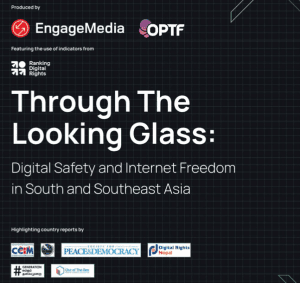Report – Digital safety and internet freedom in South and Southeast Asia
June 09, 2022 / Dev Diary, Digital Rights, Digital Security / By Sam de Silva
In late 2021, OPTF and Engagemedia started collaborating on a research report that investigated digital safety and internet freedom in South and Southeast Asia. The final report is now available. Sadly, the findings paint a bleak picture when it comes to ensuring human rights defenders and at-risk communities are safe and secure in the digital world.
The report, Through The Looking Glass: Digital Safety and Internet Freedom in South and Southeast Asia, is based on research from six country partners (see below) that investigated the capacity of human rights defenders and at-risk communities to practice digital safety. The research also analysed internet freedom conditions, including the public policies of telecommunications companies in relation to their subscribers.
There are some differences when it comes to digital safety and internet freedom situation in each of the six countries. However, it was possible to synthesise the research and draw the following key conclusions:
There is a significant skills and knowledge gap about digital safety among human rights defenders and at-risk communities;
The high level of online harassment and hate speech has a detrimental impact on human rights defenders and at-risk communities;
Cyber laws are not protecting human rights defenders against digital attacks – instead, they are often used against human rights defenders;
Telecommunications companies do not have (or are not interested in having) adequate policies to protect subscribers’ rights in terms of freedom of expression and privacy.
The report also contains a set of recommendations aimed at civil society organisations. However, without strong leadership and impactful interventions, human rights defenders will continue to remain vulnerable to digital attacks.
The report found that while shutdowns and online censorship are significant issues, attacks in the form of online hate speech and harassment by both state and non-state actors are having a crippling effect of defenders. There is an urgent need to incorporate capability building activities that empower journalists and activists to address trolling, doxxing and other forms of threats they receive especially through social media and messaging apps.
The report also found that convenience and familiarity trumps security when it comes to using communications apps with Gmail, Whatsapp and Zoom dominating use, compared to Protonmail, Signal and Jitsi.
The report’s findings suggest that digital safety training activities have mostly failed, and that more effort is required to ensure that gaps are addressed and trainings are delivered so they have impact with those attending the workshops. The report’s recommendations in relation to strengthening digital safety capacity includes:
Responding to hate campaigns: There is an urgent need for dedicated training programs focused on addressing online harassment, hate speech, doxing, and other forms of attacks that target users by sending them messages and images through their social media channels. Such training programs must provide practical strategies that minimise the mental health impacts of defenders who are vulnerable to hate campaigns.
Assessing needs: CSOs must invest more time and effort in understanding the requirements of at-risk communities, and designing digital safety program curricula that specifically address their needs.
Localising training programs: Training program curricula must be designed and localised to better address participants’ needs and concerns, using examples and case studies they can relate to. CSOs must avoid using generic digital safety programs that have not been customised to fit the local context.
Maximising safety adoption: Training program design must take into account participants’ varying levels of ICT literacy, and provide adequate time for participants to understand the concepts and put these into practice, and conduct follow up programs.
Using appropriate trainers: Programs must be delivered by trainers who are best suited to effectively engage with the participants. This could mean trainers who speak participants’ local languages, or women trainers for women participants. Specific training programs organised along gender and cultural/ethnic lines should also be considered.
The six country partners that contributed to this report include: Cambodian Center for Independent Media (Cambodia); The Institute for Policy Research and Advocacy – ELSAM (Indonesia); Society for Peace and Democracy (Maldives); Digital Rights Nepal (Nepal); Out of The Box Media Literacy Initiative Inc (Philippines); and Hashtag Generation (Sri Lanka). The analysis of the public policies of the telecommunications companies was conducted using the methodology and guidance from Ranking Digital Rights.
These partners, and other organisations that are committed to improving digital rights and promoting digital safety will need to work hard to attract the necessary resourcing and support that will be required for them to design bottom-up strategies that maximise the adoption and scalability of digital safety practices.
Latest blog posts
The OPTF and Session
The OPTF is transferring its responsibilities as steward of the Session project to the newly established Swiss foundation, the Session Technology Foundation.
READ MORE »
October 15, 2024
Cyber laws around the world: Privacy is not the policy
There is no doubt that the European Union’s GDPR has changed the cyber regulation landscape forever. As onlookers from non-EU countries urge their governments and regulators to adopt similar legislation, countries are rapidly adopting their
READ MORE »
December 04, 2022
The long and winding road : Striving for data protection in Indonesia
Juliana Harsianti is an independent researcher and journalist working at the intersection of digital technology and social impact. The long awaited Indonesian Personal Data Protection Bill was approved by the parliament on 20 September 2022.
READ MORE »
November 17, 2022
